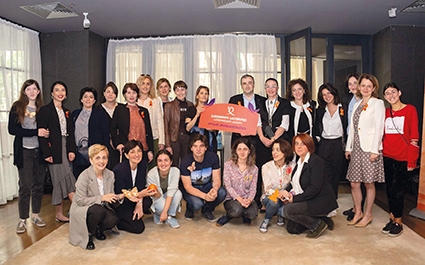#Togetherforeachother: Georgia Joins Inter’l Multiple Sclerosis Day
Aconference was held on May 30 for International Multiple Sclerosis Day, organized in the framework of the campaign “ Together for Each other” with the aim of involving the government and civil society.
Marina Janelidze, Professor of the Clinical Neurology Department of Tbilisi State Medical University, and representatives of patients with multiple sclerosis, Maia Mgeladze, Giorgi Chikvanaia and Marika Kajaia, gave speeches.
The meeting was also attended by Giorgi Biribachadze, the Head of Tbilisi Municipal Assembly and Social Issues Commission, doctors, goodwill ambassadors involved in the project, media partners and others.
The global campaign "Bringing us closer" aims to increase public awareness about this disease, its timely diagnosis and access to adequate treatment. Today, society does not have enough information about multiple sclerosis and its complications, and in some cases people are not clear what it is.
"I think this international day is very important, because many people will learn about the disease and the problems caused by it," said Giorgi Birbichadze. “People should have accurate information what multiple sclerosis means and about early diagnosis of the disease. We need an active campaign to raise awareness about the disease. I am ready to cooperate actively with the Tbilisi Municipal Assembly representative. Such meetings like today are necessary for both the public and the state, in order to put the spotlight on patients.”
Diseases caused by multiple sclerosis were discussed by the doctors. "Such days help increase awareness about the disease,” said Prof. Marina Janelidze. “Everyone should be well aware what this disease means and what is involved. Young people around 20-40 years suffering from multiple sclerosis here lack treatment, and many patients live with severe physical disability. Adequate and modern medicines can be used to prevent such severe cases.”
“The International Day of Multiple Sclerosis was held all over the world. In Georgia, the Association of Patients with Multiple Sclerosis responded to this and held a very interesting event that aims to raise awareness about multiple sclerosis in our society,” said Professor Alexander Tsiskaridze, Tbilisi State University.
The press conference also announced the social movement in the framework of the campaign #Togetherforeachother, enabling the public to exchange information about the disease and share it in support of patients suffering from multiple sclerosis.
At the end of the press conference, a video presentation was given and the main participants were David Lortkipanidze, Ana Koshadze, Ia Sukhitashvili, Zura Balanchivadze (Zurius), Goga Chanadiri, Gia Jajanidze, Eka Togonidze, Teona Dolenjashvili, and Fridon Sulaberidze, joining the project as goodwill ambassadors in order to encourage patients to increase their access to treatment to improve their quality of life and reduce the progress of their disability.
Multiple sclerosis is a chronic, progressive neurological disease and 2.3 million people worldwide suffer from this pathology. The first symptoms predominantly appear from brain nerve cells 20 to 40 years. Multiple sclerosis is the main cause of non-traumatic disability in young people. There are several forms of disease:
The recurring-remission form - the most common (80-85%). Disease occurs periodically (recidivism), inflammation of infection occurs in different parts of the brain, and then inflammation and remission (free period). The remission can last from a few months to a few years.
Secondly progressive form - Any reciprocal-remission form after a period of time transfers to a progressive form, which means that the disease is constantly progressing. The patient is aggravated and becomes handicapped.
The initially progressive form is found in 15% of patients, the disease progresses from the very beginning, remission does not appear and the patient is soon disabled.
In all forms of the disease, inflammatory processes in the nervous system accompany the death of brain nervous cells, a process which may occur even if the patient does not have clinical symptoms. The main goal of multiple sclerosis treatments is to reduce the incidence of the disease at an early stage to prevent the development of disabilities. Nowadays, the treatment of multiple sclerosis is a modifying therapy that significantly reduces the progress of disability.












